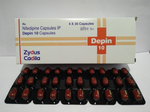myogard
Introduction to Myogard
Myogard is a well-established medication primarily used for managing cardiovascular conditions. It is formulated with Nifedipine, a potent calcium channel blocker, which helps in relaxing and widening blood vessels, thereby improving blood flow and reducing blood pressure. Myogard is commonly prescribed for individuals dealing with hypertension, angina, and other related heart conditions. Available in various forms such as tablets, capsules, and injections, Myogard offers flexible options for patients and healthcare providers to choose the most suitable form based on the patient's condition and needs.
Composition of Myogard
The primary active ingredient in Myogard is Nifedipine, present in a 10mg dosage per tablet or capsule. Nifedipine functions by blocking calcium channels in the heart and blood vessel walls. This action prevents calcium from entering the cells, leading to the relaxation of the blood vessels. As a result, there is an increase in oxygen supply to the heart and a reduction in its workload, effectively managing conditions like hypertension and angina. The effectiveness of Myogard in controlling blood pressure and preventing chest pain makes it a vital medication in cardiovascular treatment plans.
Uses for Myogard
- Management of hypertension (high blood pressure)
- Treatment of chronic stable angina (chest pain)
- Prevention of angina attacks
- Improvement of blood flow in cardiovascular conditions
Side Effects of Myogard
- Dizziness or lightheadedness
- Flushing or warmth in the face
- Headache
- Nausea
- Swelling in the hands, ankles, or feet
- Fatigue or tiredness
- Shortness of breath
Precautions for Myogard
Before taking Myogard, inform your healthcare provider about any existing medical conditions, especially heart-related issues, liver disease, or kidney problems. It is important to disclose any allergies to medications, including Nifedipine. Pregnant or breastfeeding women should consult their doctor before starting Myogard. Avoid consuming grapefruit or grapefruit juice while on Myogard, as it can interfere with the medication's effectiveness. Do not abruptly stop taking Myogard without consulting your healthcare provider, as it may worsen your condition.
Conclusion
Myogard, with its active ingredient Nifedipine, plays a crucial role in managing cardiovascular conditions such as hypertension and angina. Available in various forms, including tablets, capsules, and injections, it offers flexibility and effectiveness in treatment. While it provides significant benefits, it is essential to be aware of potential side effects and take necessary precautions. Always consult with a healthcare professional to ensure Myogard is the right choice for your health needs and to determine the appropriate dosage and form.
Similar Medicines
Available in 2 variations

Myogard 10mg Tablet
Myogard 10mg Tablet
strip of 10 tablets

Myogard 5mg Tablet
Myogard 5mg Tablet
strip of 10 tablets
Related Faqs

Do I need to change my diet while taking Depin?
Yes, making small changes to your diet can help your medicine work better. You must take a low sodium and low-fat diet, and adhere to the lifestyle changes as advised by your doctor. You should also avoid eating grapefruit (chakotra) or drinking grapefruit juice while taking Depin.

Is Depin a diuretic?
No, Depin is not a diuretic medication. However, some evidence indicates that Depin has a partial diuretic property which may result in increased sodium loss through urine. It is a medication which relaxes the blood vessels by directly acting on them. This helps to decrease the blood pressure of the individual. As a result, blood flows more easily and lowers blood pressure, which helps to reduce the strain or pressure on your heart.

Can Depin be used in pregnancy and nursing mothers?
It is advised that you should consult your doctor before taking this medicine if you are pregnant, planning to become pregnant or breastfeeding. It should be used only if prescribed by the doctor in case of pregnancy. Studies have shown significant risks to the developing baby and it is given only if the benefits are clearly more than the risks involved.

Can Myogard cause liver damage?
Yes,Myogard can cause liver damage in some cases, but this is very rare. However, some people may develop a rise in liver enzymes after taking Myogard. Let your doctor know if you notice any such changes in your recent lab tests. Do not start this medication without consulting your doctor and do inform him if you have any history of liver disease or liver damage. This is because, in case of liver damage, dose adjustment may be required.

Can Myogard be used in pregnancy and nursing mothers?
It is advised that you should consult your doctor before taking this medicine if you are pregnant, planning to become pregnant or breastfeeding. It should be used only if prescribed by the doctor in case of pregnancy. Studies have shown significant risks to the developing baby and it is given only if the benefits are clearly more than the risks involved.
Related Posts

1:15
10 Health Benefits of Hard-Boiled Eggs: Nutrition!

1:15
Which 3 Vitamins Do Seniors Need Most for Healthier Aging?

1:15
Ketogenic Diet for Weight Loss! The Key to Healthy & Effective Weight Loss!

1:15
The Mediterranean diet: Benefits and How to follow the Mediterranean diet!

1:15
Are Multivitamins Safe? Know the Risks Before You Take Them!
















.svg)
